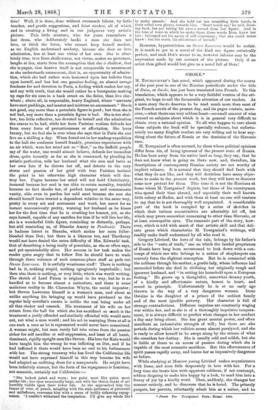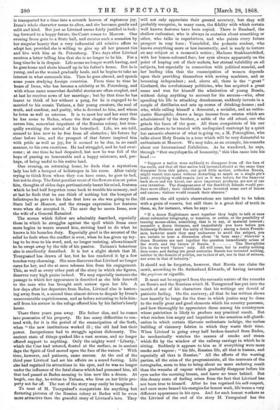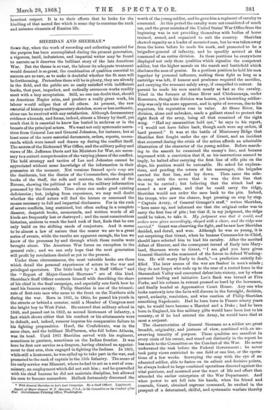SMOKE.*
M. TOURGUENEF'S last novel, which appeared during the course of the past year in one of the Russian periodicals under the title of Duim, or Smoke, has just been translated into French. To this translation, which appears to be a very faithful version of the ori- ginal, we hope to call the favourable attention of our readers. As a mere story Smoke deserves to be read much more than most of the French novels of the present day, and its pages contain, more- over,—what theirs can very seldom boast—no small amount of wise counsel on subjects about which it is in general very difficult to obtain even a rational opinion. To all who happen to care about those subjects the book will be specially welcome, but unfortu- nately too many English readers are very willing not to bear any- thing about the future of Russia or the destinies of the Slavonic race.
M. Tourguenef is often accused, by those whose political opinions differ from his, of being ignorant of the present state of Russia. He has been away from his native land so long, they say, that he does not know what is going on there now, and, therefore, his descriptions of contemporary Russian society are not worthy of implicit reliance. It is natural that they should find fault with what they do not like, and they will doubtless have many objec- tions to make to the present work, but they will have to discover some new pretext for them. This time it is not the Russians at home whom M. Tourguenef depicts, but those of his countrymen who spend their time abroad, and especially their well known little colony at Baden, and with them at least no one will venture to say that he is not thoroughly well acquainted. A considerable part of the book is occupied by a series of sketches in which their various eccentricities are admirably hit off, but which may prove somewhat unmeaning to other than Slavonic, or at least cosmopolite eyes. The romantic part of the story, how- ever, which is told with much of that artistic skill and that deli- cate grace which characterize M. Tourguenef's writings, will readily make itself understood by all who read it.
Gregory Litvinof, the hero of the tale, belongs by his father's side to the " caste of trade," one on which the landed proprietors of Russia have long been accustomed to look down with a con- tempt of which one who belongs to a nation of shopkeepers can scarcely form the slightest conception. But he is connected with the noblesse through his mother, a gentle lady, whose influence had succeeded before she died in civilizing her originally rough and ignorant husband, and "in setting his household upon a European footing." He grows up a thoughtful, somewhat dreamy youth, of a kindly and affectionate nature, honest in heart, and sound in principle. Unfortunately he is at an early age thrown in the way of a very dangerous woman. Irene Osinine is the daughter of a prince of the noblest family and of the most ignoble poverty. Her character is full of strange contradictions. Different impulses are constantly waging war within her, and as she is of a thoroughly impulsive tempera- ment, it is always difficult to predict what changes in her conduct a day may bring about. She has great mental power, and often manifests an indomitable strength of will ; but there are also periods during which her volition seems almost paralyzed, and she is ready to allow herself to be swept along by the stream of what she considers her destiny. She is usually cold and selfish, but she is liable at times to an access of passion during which she is capable of the most romantic sacrifices. But this effervescence of spirit passes rapidly away, and leaves her as impassively dangerous as before.
While studying at Moscow young Litvinof makes acquaintance with Irene, and soon falls desperately in love with her. For a long time she treats him with apparent coldness, if not contempt, seldom deigning to make him happy by a look, to send him into a frenzy of joy by a kindly word. Then, suddenly, she changes her manner entirely, and he discovers that he ia loved. The princely paupers, her parents, reluctantly admit him as a suitor, and he • Puma Par Tourgudnef. Paris : Hetael. 1868. is transported for a time into a seventh heaven of rapturous joy. Irene's whole character seems to alter, and she becomes gentle and mild and kind. But just as Litvinof seems fairly justified in look- ing forward to a happy future, the Court comes to Moscow. One evening Irene goes to a State ball, and creates such a sensation by her singular beauty that a very influential old relative offers to adopt her, provided she is willing to give up all her present ties and live with him at St. Petersburg. Two days after Litvinof receives a letter telling him that she is no longer to be his. For a long time he is in despair. Life seems no longer worth having, and he goes home and shuts himself up in his father's house. But he is young, and so the wound gradually heals, and he begins to take an interest in what surrounds him. Then he goes abroad, and spends some years studying foreign countries. From time to time he hears of Irene, who has become a celebrity at St. Petersburg, and with whose name somewhat doubtful stories are often coupled, and at last he receives news of her marriage ; but by that time he has learnt to think of her without a pang, for he is engaged to be married to his cousin Tatiana, a fair young creature, the soul of truth, and candour, and purity, who is devoted to him, and whom he loves as well as esteems. It is to meet her and her aunt that he has come to Baden, where the first chapter of the story dis- covers him, somewhat impatient of the Russian 'colony, but tran- quilly awaiting the arrival of his betrothed. Life, we are told, seemed to him now to be free from all obstacles ; his future lay Blear before him, and the prospect of that future inspired him with pride as well as joy, for it seemed to be due, in no small manner, to his own exertions. He had struggled, and he had over- come ; at one time he had despaired, but now he was full of the hope of passing an honourable and a happy existence, and, per- haps, of being useful to his native land.
One evening, on returning home, he finds that a mysterious lady has left a bouquet of heliotropes in his room. After vainly trying to think from whom they can have come, he goes to bed, but not to sleep. The faint peculiar scent of the flowers almost pains him, thoughts of olden days pertinaciously haunt his mind, features which he had half forgotten come back to trouble his memory, and at last he finds that he can think of nothing but the bouquet of heliotropes he gave to his false first love as she was going to the State ball at Moscow, and the strange expression her features wore when she accepted it. The next day he meets Irene, now the wife of a General Ratmirof.
The scenes which follow are admirably described, especially those in which he struggles against the spell which Irene once more begins to weave around him, striving hard to do what he knows is his bounden duty. Especially good is the account of the relief he feels when the conflict is over, when he has given up try- ing to be true to his word, and, no longer resisting, allows himself to be swept away by the tide of his passion. Tatiana's behaviour also is excellently described. It is but a slight sketch that M. Tourguenef has drawn of her, but he has rendered it by a few touches very charming. She soon discovers that Litvinof no longer cares for her, and she at once releases him from his engagement. This, as well as every other part of the story in which she figures, deserves very high praise indeed. We may especially instance the passage in which her appearance is described as she bids farewell to the man who has brought such sorrow upon her life. A few days after her departure from Baden, Litvinof also is hasten- ing away from it, a second time almost driven to despair by Irene's unaccountable capriciousness, and as before returning to hide him- self from his sorrow in the refuge offered him by his father's lonely house.
There three years pass away. His father dies, and he comes into possession of his property. He has many difficulties to con- tend with, for it is the period of the emancipation of the Serfs, when " the new institutions worked ill ; the old had lost their power. Inexperience had to struggle against dishonesty. The ancient state of things quaked like a vast morass, and no longer offered support to anything. Only the mighty word ' Liberty,' which the Czar had uttered, floated at the surface, as in ancient days the Spirit of God moved upon the face of the waters." With time, however, and patience, came success. At the end of the third year Litvinof had set his affairs on a sound footing. Life also had regained its attractions in his eyes, and he was no longer under the influence of the fatal charm which had possessed him, all that had passed at Baden seeming to him now like a dream. At length, one day, he writes to Tatiana, who lives on her little pro- perty not far off. The rest of the story may easily be imagined.
To most of M. Tourgnenef's compatriots his anything but flattering pictures of the Russian colony at Baden will be even more attractive than the graceful story of Litvinof's love. They will not only appreciate their general accuracy, but they will probably recognize, in many cases, the fidelity with which certain well known features have been copied. There is Bambaef, the shallow enthusiast, who is always in ecstasies about something or other, who talks in superlatives, and who paints every future prospect in rosy hues ; Vorochilof, the pedantic student, who knows everything more or less incorrectly, and is ready to lecture on any subject at a moment's notice ; Madame Soukhantchikof, with her lemon-coloured face, her eyes always apparently on the point of leaping out of their sockets, her eternal volubility on all subjects, but especially iu connection with political scandal, and her leading idea that the emancipation of women depends upon their providing themselves with sewing machines, and so becoming independent ; and, above all, there is the " great" Goubaref, the revolutionary politician, who has acquired a great name and won for himself the admiration of young Russia, without doing anything to account for his success—who, after spending his life in attacking drunkenness, suddenly invests in a couple of distilleries and sets up scores of drinking-houses ; and who, while calling himself a democrat, a socialist, and an enthu- siastic Slavophile, draws a large income from estates which are administered by his brother, a noble of the old school, one who grinds the faces of the poor. All these compatriots of his our author allows to be treated with undisguised contempt by a quiet but sarcastic observer of what is going on, a M. Potoughine, who talks about Holy Russia in a tone which will be very distasteful to enthusiasts at Moscow. We may take, as an example, his remarks about our International Exhibition. As he wandered, he says,
through "that encyclopgelia of humanity," this idea came into his head:— "Suppose a fiation were suddenly to disappear from off the face of the earth, and that all that nation had invented should at the same time disappear from this palace, our good little mother, orthodox Russia, might vanish into space without disturbing so mach as a single pin's head; everything would remain just as it was before, for the Samovar bark shoes and the knout, our most important products. are not of our own invention. The disappearance of the Sandwich Islands would pro- duce more effect; their inhabitants have invented some sort of lances and canoes ; visitors would remark their absence."
Of course the old cynic's observations are intended to be taken with a grain of reserve, but still there is a great deal of truth in them, as, for instance, when he says :-
" If a dozen Englishmen meet together they begin to talk at once about submarine telegraphy, or taxation, or cotton, or the possibility of tanning mouse-skins, something, that is to say, of material interest ; assemble a dozen Germans, and immediately you have before you Schleswig-Holstein and the unity of Germany ; among a dozen French- men, however much they may endeavour to avoid the subject, you are certain to hear a discussion about 'le beau ease;' wherever a dozen Russians are met together the question immediately arises of
the worth and the future of Russia. The Slavophiles live in the word future' only. All will come, but in reality nothing does come, and during ten great centuries Russia has invented nothing, neither in the domain of politics, nor in that of art, nor in that of science, nor even in that of industry."
It should not be forgotten, however, that Russia can claim the merit, according to Mr. Sutherland Edwards, of having invented the papiross or cigarille.
It must not be supposed from the sarcastic nature of the remarks on Russia and the Russians which M. Tourguenef has put into the mouth of one of his characters that his writings are devoid of patriotic feeling. On the contrary, all that he has written shows how heartily he longs for the time in which justice may be done to the really great and good elements which his country possesses, and how thoroughly he appreciates those among his countrymen whose patriotism is likely to produce any practical result. But what renders him angry and impatient is the senseless self-glorifi- cation in which certain Slavonic enthusiasts indulge, the useless building of visionary fabrics in which they waste their time. When Litvinof is going away half broken-hearted from Baden, he mechanically watches the masses of smoke and steam which flit by the window of the railway carriage in which he is sitting. Suddenly it appears to him as if everything were mere smoke and vapour ; " his life, Russian life, all that is human, and especially all that is Russian." All the efforts of the warring parties, all the cries of the progressionists, all the murmurs of the retrogrades, seem to him to bring about no more enduring result than the wreaths of vapour which gradually disappear before his eyes under the morning breeze, and leave no trace behind. But this dreary state of feeling arises from the fact that Litvinof has not been true to himself. After he has regained his self-respect, and once more braced his energies for honest work, lifeWears a very different appearance in his eyes. And for such honest workers as the Litvinof of the end of the story M. Tourguenef has the
heartiest respect. It is to their efforts that he looks for the kindling of that sacred fire which is some day to consume the rank and noisome elements of Russian life.




































 Previous page
Previous page